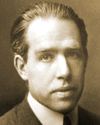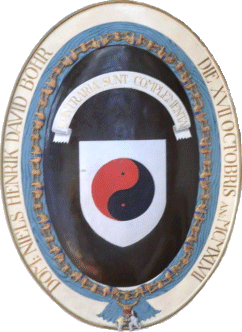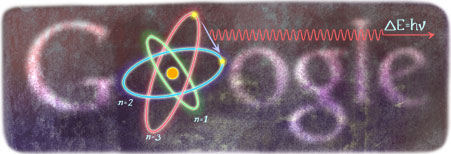 Niels Henrik David Bohr
was awarded the Nobel prize for physics in 1922.
Niels Henrik David Bohr
was awarded the Nobel prize for physics in 1922.
His fourth son,
Aage
N. Bohr (1922-2009) grew up to be a world-class physicist in his own right,
earning a Nobel Prize in 1975.
In 1947, Niels Bohr was awarded the
Order of the Elephant,
a prestigious Danish distinction normally reserved for royalty or distinguished generals
(the only other Danish scientist who received that honor was
Tycho Brahe, in 1578).
Members of the Order of the Elephant have their coats-of-arms displayed on a
wall-of-fame at Frederiksborg Castle.
Since Niels Bohr did not have a coat-of-arms,
he designed one himself around the Tai-Chi
(yin-yang symbol) which he envisioned as a striking traditional representation of the principle of
complementarity on which he based his views of the fundamental laws of physics.
Also known as the wave-particle duality, this principle stresses that physical fields have
properties which are usually
attributed either to particles or to waves.
Robert Oppenheimer (1904-1967)
was a great admirer of Bohr. Speaking about him fondly at
UCLA on
1964-05-14, he had this to say:
Bohr's brother was a little younger (Harald)
and he was to become a very eminent mathematician.
So that, from very early and throughout his life, Bohr had a somewhat estranged love for mathematics.
He didn't do much of it but he admired it and he used it occasionally. He recognized in it
an immense enlargement of language, an ability to talk about things which in words would be simply inaccessible
and they were lifelong friends.
Google celebrated the 127th Birthday of Niels Bohr by using the
following version of their logo on their main webpage worldwide, on Sunday, October 7th, 2012:




